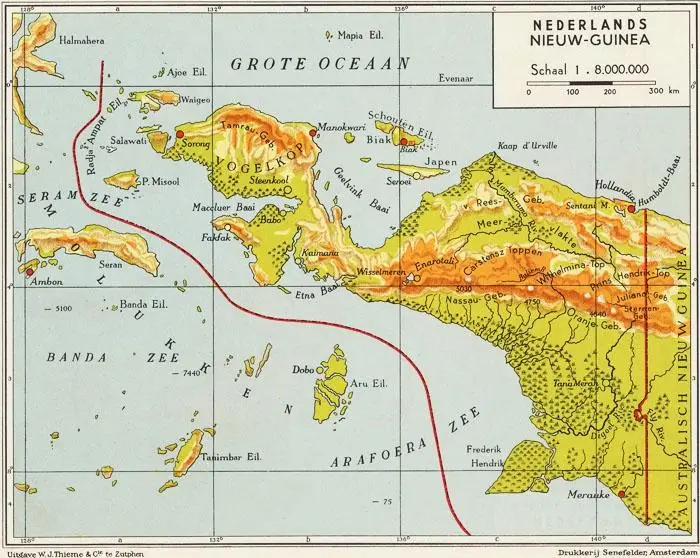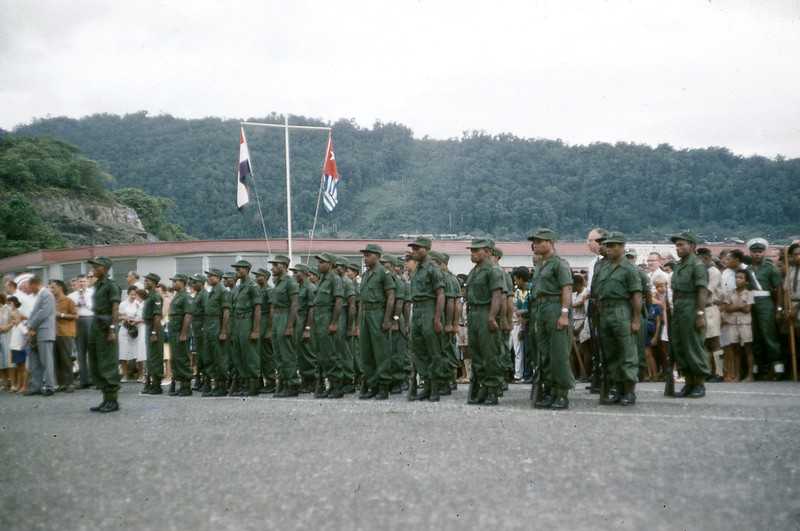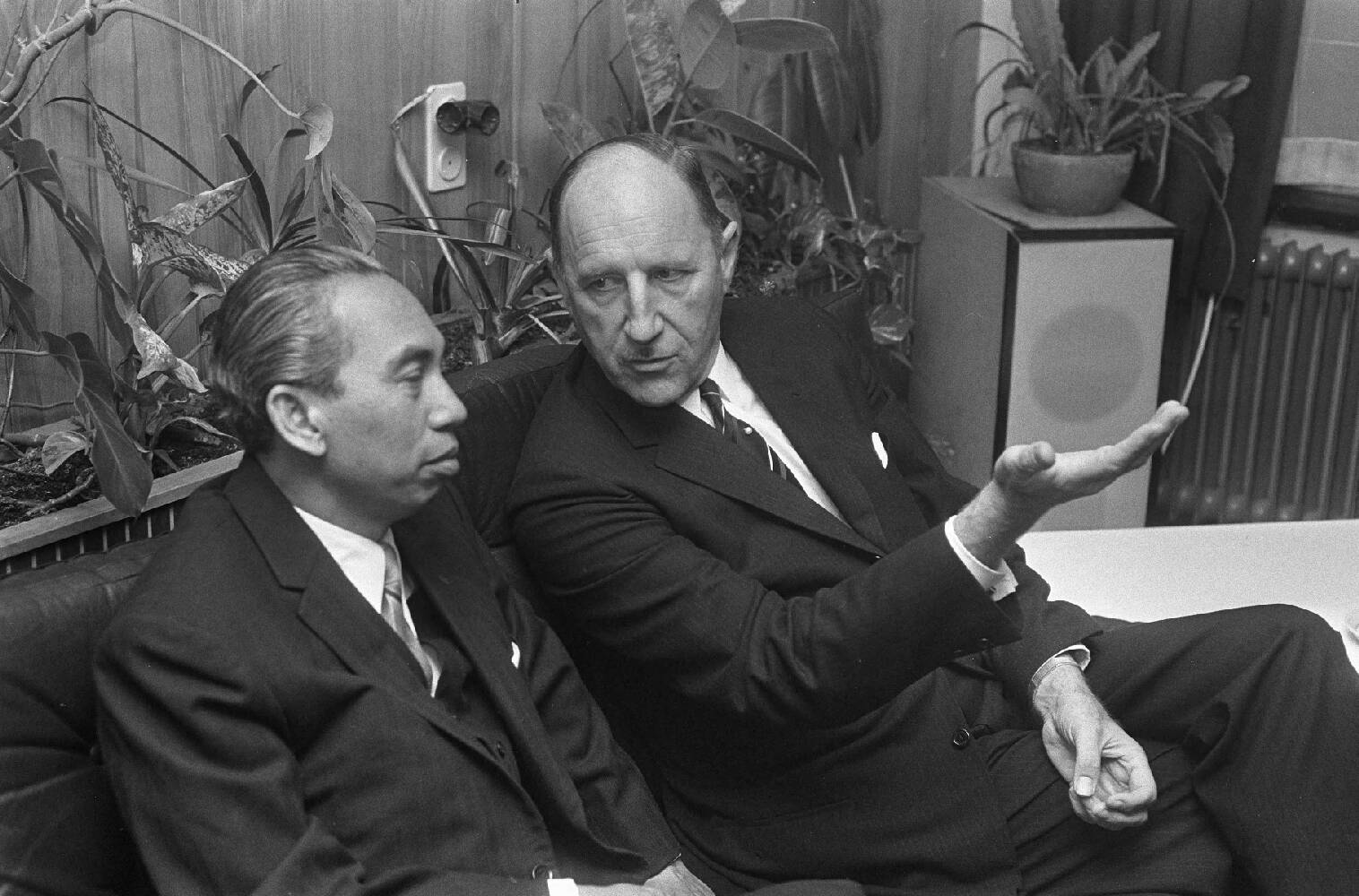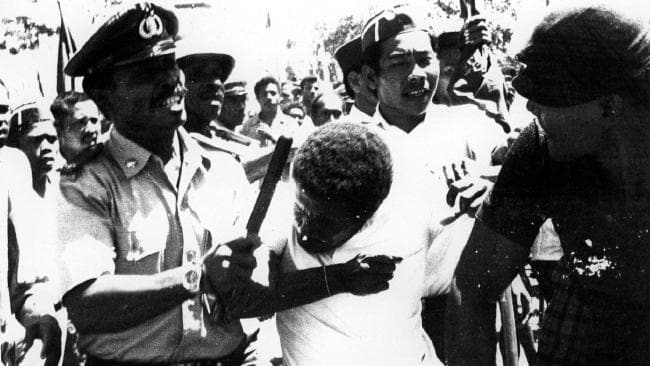
After Indonesia's transfer of sovereignty, Dutch New Guinea (West Papua) remained under Dutch control. The Netherlands considered itself responsible for the development of the region, investing in infrastructure and education, while still acting as a colonial power. Before 1949, the region was part of the Dutch East Indies.
On April 5, 1961, the New Guinea Council, the first Papuan parliament, was officially installed as part of the preparations for the independence and decolonization of West Papua.

On December 1, 1961, the national symbols of West Papua were presented in Hollandia (now Jayapura). The ceremony marked the birth of the future of an independent West Papua nation. The Morning Star flag, the national emblem 'One People One Soul', the national anthem 'Hai Tanahku Papua', and the country name West-Papua were unveiled.

On December 19, 1961, Indonesian President Sukarno delivered his infamous Trikora speech, in which he called for the military occupation of West Papua, which he referred to as "liberation." However, for the Papuans, this was not liberation, but an illegal military invasion by a country that had no claim to the region. This occurred just 18 days after West Papua had presented its national symbols.

The New York Agreement, signed on August 15, 1962, was a betrayal of the people of West Papua. It was concluded without their involvement, resulting in West Papua being handed over to Indonesia without their consent. The Netherlands, under pressure from the US, agreed to the transfer of sovereignty in exchange for the guarantee that a referendum would take place, the Act of Free Choice, in which the people of West Papua would determine their future and decide whether or not they wanted to be part of Indonesia.
Between October 1, 1962, and May 1, 1963, West Papua was temporarily governed by the United Nations through the United Nations Temporary Executive Authority (UNTEA).

On May 1, 1963, West Papua was annexed by Indonesia, following the temporary transfer under the United Nations in 1962.

The Rome Joint Statement of May 1969 confirmed that Indonesia wanted to follow the terms of the New York Agreement, including the implementation of the so-called "Act of Free Choice." However, instead of a fair referendum with the principle of "one man, one vote," Indonesia indicated it would use the Javanese musyawarah system.
The then Minister of Foreign Affairs, Luns, stated that the meeting was intended to convince Indonesia to carry out the Act of Free Choice in a fair manner, but in reality, the focus was more on protecting economic interests than on the freedom of the Papuans.

The so-called Act of Free Choice in 1969 was presented as a referendum in which the people of West Papua could determine their own future. In reality, however, this was not a free choice.
Instead of every resident of West Papua having the right to cast their vote, only 1,025 men were forced under the threat of violence by Indonesian military personnel to make their so-called "choice" to join Indonesia. The remaining 798,975 people from West Papua were ignored. The outcome of the Act of No Choice was already determined, and the people of West Papua had no real influence over their future.

On November 19, 1969, UN Resolution 2504 (XXIV) was approved, recognizing the result of the Act of Free Choice without any critical discussion. Instead of protecting the human rights of the Papuans, the UN agreed to ignore the Papuans' right to self-determination by Indonesia. The UN, originally founded to safeguard the rights of peoples, made a painful concession for the political and economic interests of more powerful nations, leaving the Papuan people abandoned.
Countries that abstained from voting on UN Resolution 2504 on November 19, 1969:
| Barbados | Botswana | Brazilië | Centraal-Afrikaanse Republiek | Congo (Brazzaville) | Congo (Leopoldville) |
| Colombia | Costa Rica | Dahomey | Ecuador | Equatoriaal-Guinea | Gabon |
| Gambia | Ghana | Guyana | Israël | Ivory Coast | Jamaica |
| Kenia | Kameroen | Lesotho | Malawi | Niger | Oeganda |
| Sierra Leone | Somalië | Swaziland | Togo | Trinidad en Tobago | Verenigde Republiek Tanzania |
| Upper Volta | Venezuela | Zambia |

July 1 is a very important memorial day for many Papuan. On this day in 1971, the OPM (Organisasi Papua Merdeka), led by Seth Rumkorem and Jacob Prai, declared the independent state of West Papua. This Proklamasi Kemerdekaan (Declaration of Independence) marks a milestone in our ongoing struggle for our ultimate goal: the complete liberation of West Papua from the colonial domination of Indonesia.

